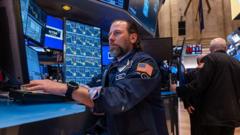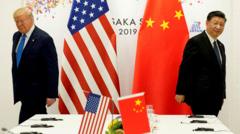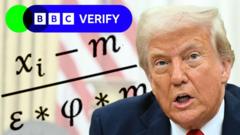The U.S. stock market suffered significant declines, facing its worst weekly performance since 2020, amid escalating trade tensions following President Trump's tariff announcements and China's retaliatory measures.
Stocks Dive as China Responds to Trump’s Tariffs

Stocks Dive as China Responds to Trump’s Tariffs
Market instability escalates as China's retaliatory tariffs deepen concerns over a potential global trade war.
In a dramatic turn of events on Friday, stock markets experienced severe turmoil as China pushed back against the tariffs recently announced by President Donald Trump. The U.S. stock market faced massive drops, with all three major indexes falling over 5%. The S&P 500 index alone experienced a close to 6% decline, marking the worst week for U.S. stocks in three years.
In the wake of Trump's sweeping new 10% import taxes on goods from numerous countries—including major trading partners like China and the European Union—global stock markets saw their value plummet, with investors reacting to the evolving trade tensions. The steepest decline was noted in the U.K., where the FTSE 100 fell nearly 5%, and similar downturns were reported in Asia and Europe. Analysts suggest that Trump's strategy represents the largest tax increase in the U.S. since 1968 and predict potential economic repercussions that could lead to a global recession.
China's response featured imposing tariffs of 34% on U.S. goods and restricting exports of vital minerals, framing the U.S. actions as "bullying." Amidst these developments, the EU and other nations showcased intentions to defend their economic interests while remaining open to negotiations, although clarity on the White House's stance on talks remains elusive.
Despite market apprehension, Trump maintained a firm stance, urging supporters to remain steadfast and downplaying the market downturn. Financial analysts expressed concern regarding the long-term implications of the tariffs, with predictions of reduced U.S. growth and potential inflation spikes. JP Morgan raised the chances of a global recession to 60%, asserting that the tariff shock could cause a notable reduction in U.S. economic growth.
Investor sentiment appeared mixed as certain sectors rallied, with the housing market showing signs of strength potentially due to lower mortgage interest rates. Despite this, major corporations heavily reliant on Asian suppliers, like Apple, reported considerable stock losses, with analysts warning of a prolonged period of uncertainty and volatility in the markets.
As concerns linger about escalating trade conflicts, even voices from within the Republican party, like Senator Ted Cruz, warned of significant risks stemming from these tariff policies. Farmers and exporters expressed their trepidation, anticipating surging costs and declining international sales.
The unfolding situation leaves many, from American farmers to global businesses, pondering the potential long-term impact of these trade negotiations and retaliatory measures, a narrative that may shape economic relations in the coming months.
In the wake of Trump's sweeping new 10% import taxes on goods from numerous countries—including major trading partners like China and the European Union—global stock markets saw their value plummet, with investors reacting to the evolving trade tensions. The steepest decline was noted in the U.K., where the FTSE 100 fell nearly 5%, and similar downturns were reported in Asia and Europe. Analysts suggest that Trump's strategy represents the largest tax increase in the U.S. since 1968 and predict potential economic repercussions that could lead to a global recession.
China's response featured imposing tariffs of 34% on U.S. goods and restricting exports of vital minerals, framing the U.S. actions as "bullying." Amidst these developments, the EU and other nations showcased intentions to defend their economic interests while remaining open to negotiations, although clarity on the White House's stance on talks remains elusive.
Despite market apprehension, Trump maintained a firm stance, urging supporters to remain steadfast and downplaying the market downturn. Financial analysts expressed concern regarding the long-term implications of the tariffs, with predictions of reduced U.S. growth and potential inflation spikes. JP Morgan raised the chances of a global recession to 60%, asserting that the tariff shock could cause a notable reduction in U.S. economic growth.
Investor sentiment appeared mixed as certain sectors rallied, with the housing market showing signs of strength potentially due to lower mortgage interest rates. Despite this, major corporations heavily reliant on Asian suppliers, like Apple, reported considerable stock losses, with analysts warning of a prolonged period of uncertainty and volatility in the markets.
As concerns linger about escalating trade conflicts, even voices from within the Republican party, like Senator Ted Cruz, warned of significant risks stemming from these tariff policies. Farmers and exporters expressed their trepidation, anticipating surging costs and declining international sales.
The unfolding situation leaves many, from American farmers to global businesses, pondering the potential long-term impact of these trade negotiations and retaliatory measures, a narrative that may shape economic relations in the coming months.





















